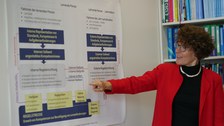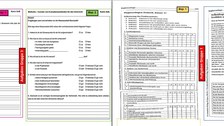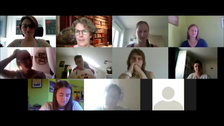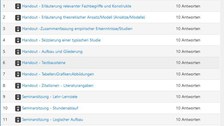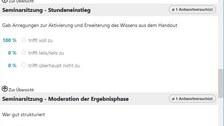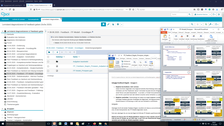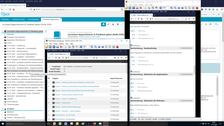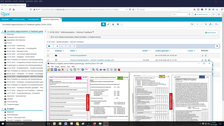Diagnosing Learners' Progress and Giving Feedback: Prof. Dr. Susanne Narciss (#SN1)
Reflecting on, discussing and applying psychological findings relating to core teaching skills in practical online settings
Format
Skills-oriented seminar – flipped classroom principle – learners as instructional designers
Hybrid: asynchronous preparation and follow-up work for the seminar via self-regulated study of materials available online;
synchronous, interactive, weekly online seminar sessions
Keywords
Flipped classroom, skills orientation, learners as instructional designers, psychology of teaching and learning, teacher training students

© Susanne Narciss

© Susanne Narciss
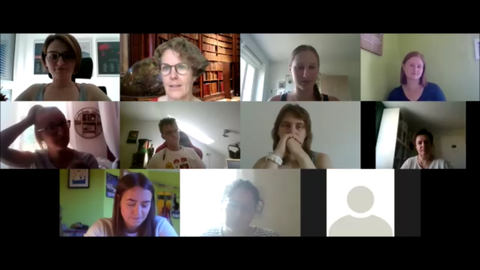
© Susanne Narciss

© Susanne Narciss

© Susanne Narciss

© Susanne Narciss
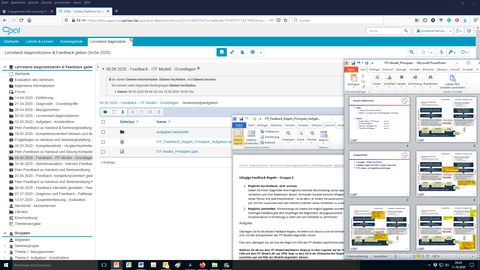
© Susanne Narciss
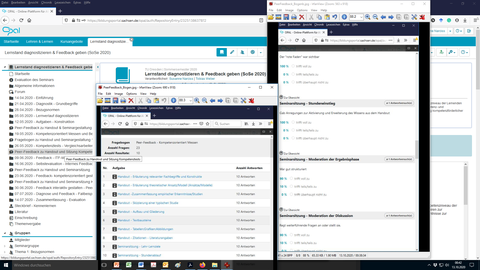
© Susanne Narciss
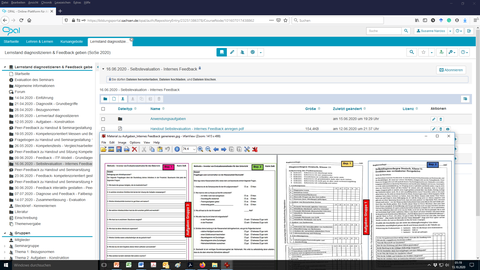
© Susanne Narciss
Description
Goals and content
Formative assessment and feedback strategies are key factors for successful and effective teaching (Hattie, 2012). However, designing and implementing them in a professional and reflective manner is complex and requires knowledge and skills relating to the following questions:
- From a psychological perspective, what characterizes assessment and feedback strategies that bolster learning and motivation?
- What materials, instruments and tools can be used to develop formative assessment and feedback strategies?
- To what extent do situational and individual factors need to be considered in using these strategies, resources or tools? How should this be done?
The seminar thus focused on the following goals and content:
- Production and consolidation of broad, integrated knowledge and understanding of the psychological findings on the conditions and impact of formative assessment and feedback strategies.
- Application of psychological principles in the analysis of and reflection on typical feedback scenarios in a school setting (e.g. skills matrices for formative assessment scenarios, formative feedback instruments).
- Scientifically founded discussion of students’ reflections on the materials used for assessment and feedback in a school setting.
- Integration and application of findings to the analysis and optimization of a typical assessment and feedback strategy in a school setting (working with complex case studies).
(Online) teaching and learning scenario
The outlined goals were put into practice in a skills-based seminar, which was organized online with synchronous and asynchronous phases according to the flipped classroom principle. The central objective was to create as much time and space as possible to take efforts beyond simply studying the psychological findings on formative assessment and feedback strategies using academic texts. Moreover, we wanted to use curriculum-based materials and scenarios as a foundation for reflecting on which individual and situational factors should be taken into consideration in applying our insights.
Study activities, organization and tools
All study materials and instructions were uploaded to OPAL as preparation for and follow-up to the seminar courses. The students had 24/7 access to these materials and were tasked with studying a handout on each topic prior to its discussion in the seminar. Furthermore, all materials created in the synchronous seminar classes (e.g. short profiles, group work solutions) and a formative peer feedback form for each class were uploaded to OPAL.
The seminar sessions themselves were held online. The students used these to reflect and elaborate on the content they studied by themselves on the basis of questions with a real-world application. These sessions began with warm-up activities to promote cognitive activation, followed by transfer tasks to be completed in small groups. Each group’s results were then shared and discussed with the whole class. At the end of each session, we collected the “take-home messages” of the topic.
For the weekly synchronous, interactive online seminar sessions, we used tools such as Zoom with all of its interactive features (e.g. quiz, break-out rooms) as well as quiz tools (e.g. Kahoot) and online collaboration tools (e.g. cryptpad), depending on the task at hand. A PowerPoint presentation was often used to help organize and moderate the classes.
Instructional psychological approach
The instructor demonstrated and elucidated the general procedure multiple times during the first phase of the seminar. Starting in the 5th session, students prepared presentations (typically in small groups) complete with handouts, activation tasks, group tasks and moderation materials compatible with the online learning format. As a quality assurance measure, the groups met with the seminar instructor online prior to the presentation to critically review the material and rework it if necessary.
Each seminar was followed by feedback. The presenters had the opportunity to receive multi-perspective feedback on the session from their peer group and seminar instructor via a formative feedback questionnaire. They also used the questionnaire to record feedback from their own standpoint. The presenters and the seminar instructor used the various feedback perspectives in the online follow-up sessions for continued reflection.
The 6 groups of presenters displayed great commitment, creativity and research-based knowledge of their topics, and superbly mastered online moderation. The students also worked exceedingly well together in the individual seminar sessions, leading to engaging and enriching group discussions.
Contact
Voting ID
#SN1

